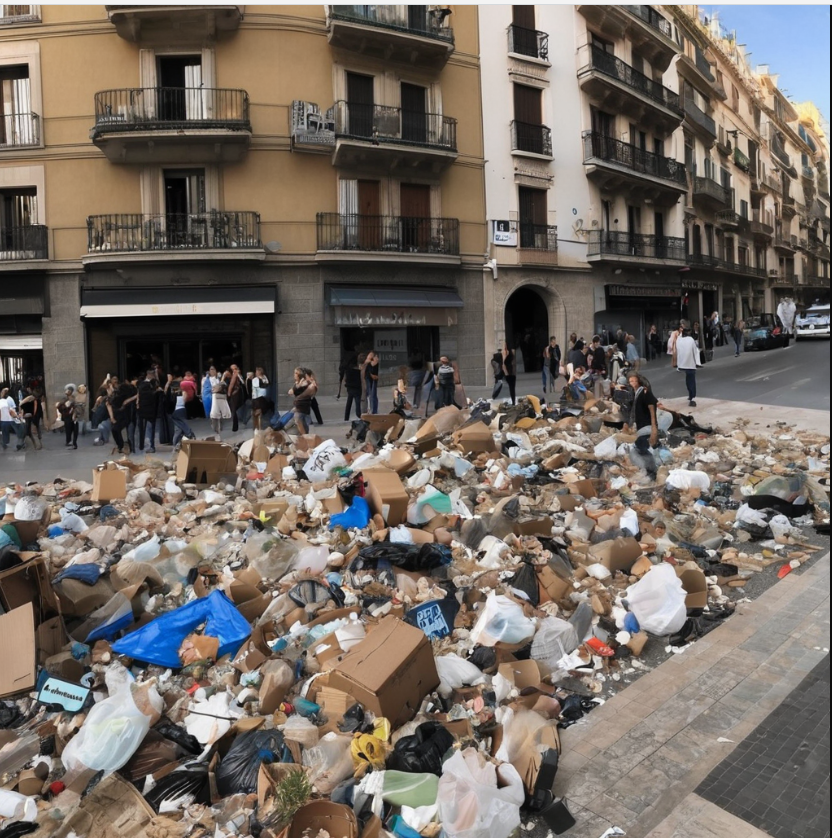Daily Life Disruptions
The rise of mass tourism in popular destinations like Spain has led to significant backlash from local residents, who are increasingly voicing their discontent and taking action against the influx of visitors. The protests in Barcelona and Mallorca highlight the trash tourism has on local communities, from skyrocketing property prices to daily inconveniences caused by overcrowding. This phenomenon drives locals out of their homes as they can't compete with the high rents driven by short-term tourist accommodations.
Daily Life Disruptions: The everyday life of residents is disrupted by the sheer number of tourists. Public transportation becomes overcrowded, and essential services like street cleaning are strained under the increased load, leading to a decline in the quality of life.
Local Business Accessibility: Tourists occupying local restaurants and other facilities make it difficult for residents to enjoy their favorite spots. This contributes to a sense of alienation and frustration among locals. This issue is not isolated to Spain. Countries such as Japan, Austria, and Mexico are also Venice in Italy, grappling with the challenge of balancing the benefits of tourism with the needs of their residents. These nations are exploring ways to create sustainable tourism models that protect local communities while still benefiting from the economic boost that tourism provides.
New ways, to encourage practices that minimize environmental impact and spread the benefits of tourism more evenly throughout the year can reduce the pressure on popular destinations. This includes promoting off-season travel and lesser-known attractions.
The Big Infrastructure: Improving public services and infrastructure to handle the influx of tourists can mitigate some of the negative impacts. This might involve expanding public transport capacity and enhancing waste management systems.
In substance, these challenges require a concerted effort from governments, businesses, and communities to develop strategies that promote sustainable and inclusive tourism.
The rise of mass tourism in popular destinations like Spain has led to significant backlash from local residents, who are increasingly voicing their discontent and taking action against the influx of visitors. The protests in Barcelona and Mallorca highlight the trash tourism has on local communities, from skyrocketing property prices to daily inconveniences caused by overcrowding. This phenomenon drives locals out of their homes as they can't compete with the high rents driven by short-term tourist accommodations.
Daily Life Disruptions: The everyday life of residents is disrupted by the sheer number of tourists. Public transportation becomes overcrowded, and essential services like street cleaning are strained under the increased load, leading to a decline in the quality of life.
Local Business Accessibility: Tourists occupying local restaurants and other facilities make it difficult for residents to enjoy their favorite spots. This contributes to a sense of alienation and frustration among locals. This issue is not isolated to Spain. Countries such as Japan, Austria, and Mexico are also Venice in Italy, grappling with the challenge of balancing the benefits of tourism with the needs of their residents. These nations are exploring ways to create sustainable tourism models that protect local communities while still benefiting from the economic boost that tourism provides.
New ways, to encourage practices that minimize environmental impact and spread the benefits of tourism more evenly throughout the year can reduce the pressure on popular destinations. This includes promoting off-season travel and lesser-known attractions.
The Big Infrastructure: Improving public services and infrastructure to handle the influx of tourists can mitigate some of the negative impacts. This might involve expanding public transport capacity and enhancing waste management systems.
In substance, these challenges require a concerted effort from governments, businesses, and communities to develop strategies that promote sustainable and inclusive tourism.
Daily Life Disruptions
The rise of mass tourism in popular destinations like Spain has led to significant backlash from local residents, who are increasingly voicing their discontent and taking action against the influx of visitors. The protests in Barcelona and Mallorca highlight the trash tourism has on local communities, from skyrocketing property prices to daily inconveniences caused by overcrowding. This phenomenon drives locals out of their homes as they can't compete with the high rents driven by short-term tourist accommodations.
Daily Life Disruptions: The everyday life of residents is disrupted by the sheer number of tourists. Public transportation becomes overcrowded, and essential services like street cleaning are strained under the increased load, leading to a decline in the quality of life.
Local Business Accessibility: Tourists occupying local restaurants and other facilities make it difficult for residents to enjoy their favorite spots. This contributes to a sense of alienation and frustration among locals. This issue is not isolated to Spain. Countries such as Japan, Austria, and Mexico are also Venice in Italy, grappling with the challenge of balancing the benefits of tourism with the needs of their residents. These nations are exploring ways to create sustainable tourism models that protect local communities while still benefiting from the economic boost that tourism provides.
New ways, to encourage practices that minimize environmental impact and spread the benefits of tourism more evenly throughout the year can reduce the pressure on popular destinations. This includes promoting off-season travel and lesser-known attractions.
The Big Infrastructure: Improving public services and infrastructure to handle the influx of tourists can mitigate some of the negative impacts. This might involve expanding public transport capacity and enhancing waste management systems.
In substance, these challenges require a concerted effort from governments, businesses, and communities to develop strategies that promote sustainable and inclusive tourism.
0 Comentários
0 Compartilhamentos
2K Visualizações




